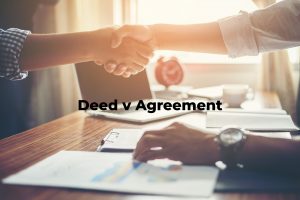In Australia, legal documents play a crucial role in various aspects of daily life, from business contracts to property transactions and dispute resolution. Two common types of legal documents that are frequently used are Deeds and Agreements. Whilst both serve the purpose of recording and formalising commitments between parties, they have distinct differences in their form, enforceability and the circumstances in which they are used.
Deed – A More Formal Commitment
A Deed, in the legal context, is a formal and binding document that creates an obligation or conveys a right or interest in property, such as a Deed of Assignment, Deed of Termination, Deed of Variation, Deed of Settlement and Release and a Deed of Confidentiality. Unlike a simple agreement, a Deed requires additional formalities to be valid. In Australia, these formalities are outlined in various state and territory legislation, common law and equitable principles.
No Consideration Required
One of the most significant differences between a Deed and an Agreement is that a Deed does not require consideration (something of value exchanged between parties). This means that a Deed can be used even when one party receives nothing in return. In contrast, Agreements generally require a reciprocal exchange of something of value. Thus, a Deed is generally not enforceable in equity.
Formalities
Deeds typically require specific formalities to be considered valid. These formalities may include signatures (meaning executed in writing), witnessing (not by a party to the deed), and the use of particular words, such as “Executed as a Deed” in the document’s opening clause and execution clause.
Statute of Limitations
A limitation period is the amount of time within which a party can commence Court proceedings. Deeds are subject to a longer statute of limitations than Agreements. In most Australian states, an action founded on a Deed may be brought within 12-15 years from the date of the Deed, whereas actions based on simple Agreements are typically limited to 6 years.
Sealing
Historically, Deeds required a wax seal to be affixed by the party executing the Deed. While this practice is no longer a strict requirement, the term “Deed” is derived from the Old English word “Deed,” which means an act or something done, emphasising the importance of formality and solemnity. When the parties sign, seal (executed as a Deed) and deliver the Deed, the execution is completed.
Agreement – A Less Formal Understanding
An Agreement, on the other hand, is a broader category of legal documents used to record commitments between parties. Agreements encompass a wide range of documents, from simple verbal agreements to more formal, written contracts.
Consideration Required
For an Agreement to be valid, it must involve, among others, a consideration, which means that both parties must exchange something of value, whether it is goods, services, money, or promises.
Flexibility
Agreements are generally more flexible than Deeds. Parties can tailor the terms and conditions to suit their specific needs and preferences. This makes Agreements a common choice for various transactions, such as Employment Agreements, Lease Agreements and Sales Agreements.
Formal Requirements
Whilst Agreements do not require the same level of formality as Deeds, it is still advisable to have them in writing to avoid disputes or misunderstandings. Verbal Agreements can be legally binding in some situations, however may be challenging ad costly to prove in Court.
Enforceability
Agreements are legally enforceable, however the process of enforcement may differ from that of Deeds. Courts may require a higher burden of proof for Agreements, such as demonstrating that there was a genuine meeting of the minds between the parties.
Choosing Between a Deed and an Agreement
The decision to use a Deed or an agreement should be based on the specific circumstances of the transaction or commitment at hand. Factors to consider include the presence or absence of consideration, the need for formality, the nature of the obligations, and the statute of limitations.
The IP House Lawyers years of experience in drafting and preparing tailored Agreements and Deeds for its clients. We have assisted many clients over the years to ensure that the chosen document aligns with the clients’ intentions and requirements, whilst simultaneously complying with relevant laws and regulations.
For any further information or queries on the above content, please contact us.
The Author
Jean Kallmyr | Lawyer, The IP House Lawyers | t: 0435 799 831 | e: admin@theiphouse.com.au
Key Contact
Claire Darby | Managing Director/Lawyer, The IP House Lawyers | t: 0412 998 951 | e: claire@theiphouse.com.au
Disclaimer
The information and contents of this publication do not constitute any legal or financial advice. This publication is intended only for reference purposes for The IP House Lawyers’ clients and prospective clients.
Image by jcomp on Freepik

